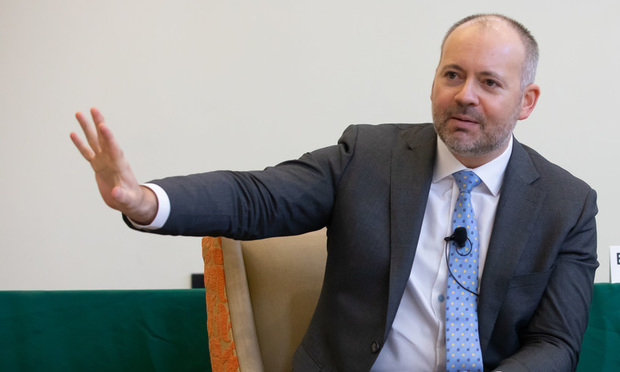Law Professor Has Bone to Pick With Class-Action Lawyers, Judges
Are class-action lawsuits more effective at tackling corporate misconduct than government agencies? Brian T. Fitzpatrick says they are.
January 29, 2020 at 12:57 PM
5 minute read
 Brian Fitzpatrick, law professor at Vanderbilt University, speaking at the 2020 Class Action & Complex Litigation Forum at the University of Miami. Photo: Jenny Abreu.
Brian Fitzpatrick, law professor at Vanderbilt University, speaking at the 2020 Class Action & Complex Litigation Forum at the University of Miami. Photo: Jenny Abreu.
Vanderbilt University law professor and former law clerk to U.S. Supreme Court Justice Antonin Scalia Brian T. Fitzpatrick has a bone to pick with litigators and judges handling class-action lawsuits.
In light of recent rule changes aimed at streamlining cases, Fitzpatrick claims now is the time to remove some financial burdens for defendants, who he says are regularly forced to settle lawsuits for more than they're worth—simply to avoid facing enormous discovery costs.
But critics say such a move would deprive consumers of their most powerful tool for holding large corporations accountable.
"I think our courts have the power now to split the costs of discovery a little more evenly, and I think they should be more willing to do that, so defendants are not forced to oversettle cases," he said following a presentation to the 2020 Class Action & complex Litigation Forum at the University of Miami. "And plaintiffs won't file meritless cases because they think they can get a settlement, because defendants don't want to spend money on discovery."
Fitzpatrick is also calling for a change in the fee formula. He argues that instead of paying plaintiffs lawyers based on the number of hours they've spent on a class action case, they should be paid based on results.
"That doesn't give the lawyer good incentive to spend a lot of hours working on a case," he said. "Judges should only pay lawyers a percentage of the actual amount of money defendants end up paying out."
The problem, Fitzpatrick claims, is that U.S. Supreme Court precedent allows judges to award fees to plaintiffs lawyers based on what a class action defendant might pay — in light of how many people could potentially file a claim. But because not all class members will necessarily fill in a claim form, it's often not the amount defendants actually pay.
Conservative case for class actions
Fitzpatrick outed himself as a conservative in favor of class-action litigation, otherwise known as a unicorn in his field.
That's because since President Ronald Reagan rose to power in the 1980s, the political right has favored a hands-off approach to business, aimed at maintaining a free marketplace that's unburdened by regulations and restrictions. Conservatives have therefore shied away from class-action litigation, because of the toll it can take on corporations.
But Fitzpatrick's book, The Conservative Case for Class Actions, claims lawyers are better enforcers than government agencies—not because of political or ethical reasons, but because of their thirst for money.
"The private sector is profit motivated, and we think that that usually leads to better outcomes than relying on government employees that get paid the same no matter what they do," Fitzpatrick said. "We like smaller government better than bigger government. If we didn't have all these plaintiffs lawyers enforcing the law, we'd have to have thousands more government lawyers to do it."
Governments are often strapped for cash and focused on politics and campaign contributions, Fitzpatrick claims, while the private sector is beholden to just one thing.
"If you have contingency fees that can be made, someone will fund your case for you," he said. "On top of that we have common sense, which is: if you think you might get sued for doing something, you're less likely to do it."
Pushback
But not everyone's convinced.
Skadden, Arps, Slate, Meagher & Flom partner John Beisner leads his firm's mass torts and insurance litigation group in Washington, D.C. He said Fitzpatrick's argument might have some appeal for individual cases but goes "off the rails" for class actions.
 John Beisner of Skadden, Arps, Slate, Meagher & Flom. Photo: Jenny Abreu.
John Beisner of Skadden, Arps, Slate, Meagher & Flom. Photo: Jenny Abreu.Instead, Beisner argues there's good reason for the public to lack confidence in a private enforcement system, which he described as "no different than permitting self-appointed police officers."
"I'm not saying the system is inherently bad," Beisner told Florida judges and attorneys at the annual forum. "What I'm saying is it's a litigation system, and it doesn't transfer to being an enforcement system."
The only way to avoid misconduct through self-dealing, Beisner argued, is by making decisions that are inherently in the public interest, rather than financial.
"Usually what happens in these settlements is a small amount is paid to class members and a large amount is paid to lawyers," he said.
Without changing a U.S. Supreme Court decision in AT&T Mobility LLC v. Concepcion, a case that expanded the rights of businesses to use contractual language to swerve class actions and compel arbitration, Fitzpatrick claims the future could be "very bleak."
"I'm worried we're going to lose the most powerful device we have to hold companies accountable when they do something wrong," he said. "People who are interested in private sector solutions in Florida should talk to their congresspeople and senators, and ask them to explain why they're not supporting the private enforcement device. Because if we don't have private enforcement, we're going to end up either with no enforcement or, even worse, government enforcement."
Read more:
'You Better Be Paying Attention': Attorneys Discuss Collision of Biometrics and Law
This content has been archived. It is available through our partners, LexisNexis® and Bloomberg Law.
To view this content, please continue to their sites.
Not a Lexis Subscriber?
Subscribe Now
Not a Bloomberg Law Subscriber?
Subscribe Now
NOT FOR REPRINT
© 2025 ALM Global, LLC, All Rights Reserved. Request academic re-use from www.copyright.com. All other uses, submit a request to [email protected]. For more information visit Asset & Logo Licensing.
You Might Like
View All
Second DCA Greenlights USF Class Certification on COVID-19 College Tuition Refunds
3 minute read

Miami Judge Approves Shaq's $11 Million Settlement to Resolve Astrals Investor Claims
3 minute read
A Voyeur Videotaped Them Undressing. Should Cruise Ship Passengers Have to Arbitrate?
3 minute readLaw Firms Mentioned
Trending Stories
- 1New York-Based Skadden Team Joins White & Case Group in Mexico City for Citigroup Demerger
- 2No Two Wildfires Alike: Lawyers Take Different Legal Strategies in California
- 3Poop-Themed Dog Toy OK as Parody, but Still Tarnished Jack Daniel’s Brand, Court Says
- 4Meet the New President of NY's Association of Trial Court Jurists
- 5Lawyers' Phones Are Ringing: What Should Employers Do If ICE Raids Their Business?
Who Got The Work
J. Brugh Lower of Gibbons has entered an appearance for industrial equipment supplier Devco Corporation in a pending trademark infringement lawsuit. The suit, accusing the defendant of selling knock-off Graco products, was filed Dec. 18 in New Jersey District Court by Rivkin Radler on behalf of Graco Inc. and Graco Minnesota. The case, assigned to U.S. District Judge Zahid N. Quraishi, is 3:24-cv-11294, Graco Inc. et al v. Devco Corporation.
Who Got The Work
Rebecca Maller-Stein and Kent A. Yalowitz of Arnold & Porter Kaye Scholer have entered their appearances for Hanaco Venture Capital and its executives, Lior Prosor and David Frankel, in a pending securities lawsuit. The action, filed on Dec. 24 in New York Southern District Court by Zell, Aron & Co. on behalf of Goldeneye Advisors, accuses the defendants of negligently and fraudulently managing the plaintiff's $1 million investment. The case, assigned to U.S. District Judge Vernon S. Broderick, is 1:24-cv-09918, Goldeneye Advisors, LLC v. Hanaco Venture Capital, Ltd. et al.
Who Got The Work
Attorneys from A&O Shearman has stepped in as defense counsel for Toronto-Dominion Bank and other defendants in a pending securities class action. The suit, filed Dec. 11 in New York Southern District Court by Bleichmar Fonti & Auld, accuses the defendants of concealing the bank's 'pervasive' deficiencies in regards to its compliance with the Bank Secrecy Act and the quality of its anti-money laundering controls. The case, assigned to U.S. District Judge Arun Subramanian, is 1:24-cv-09445, Gonzalez v. The Toronto-Dominion Bank et al.
Who Got The Work
Crown Castle International, a Pennsylvania company providing shared communications infrastructure, has turned to Luke D. Wolf of Gordon Rees Scully Mansukhani to fend off a pending breach-of-contract lawsuit. The court action, filed Nov. 25 in Michigan Eastern District Court by Hooper Hathaway PC on behalf of The Town Residences LLC, accuses Crown Castle of failing to transfer approximately $30,000 in utility payments from T-Mobile in breach of a roof-top lease and assignment agreement. The case, assigned to U.S. District Judge Susan K. Declercq, is 2:24-cv-13131, The Town Residences LLC v. T-Mobile US, Inc. et al.
Who Got The Work
Wilfred P. Coronato and Daniel M. Schwartz of McCarter & English have stepped in as defense counsel to Electrolux Home Products Inc. in a pending product liability lawsuit. The court action, filed Nov. 26 in New York Eastern District Court by Poulos Lopiccolo PC and Nagel Rice LLP on behalf of David Stern, alleges that the defendant's refrigerators’ drawers and shelving repeatedly break and fall apart within months after purchase. The case, assigned to U.S. District Judge Joan M. Azrack, is 2:24-cv-08204, Stern v. Electrolux Home Products, Inc.
Featured Firms
Law Offices of Gary Martin Hays & Associates, P.C.
(470) 294-1674
Law Offices of Mark E. Salomone
(857) 444-6468
Smith & Hassler
(713) 739-1250






